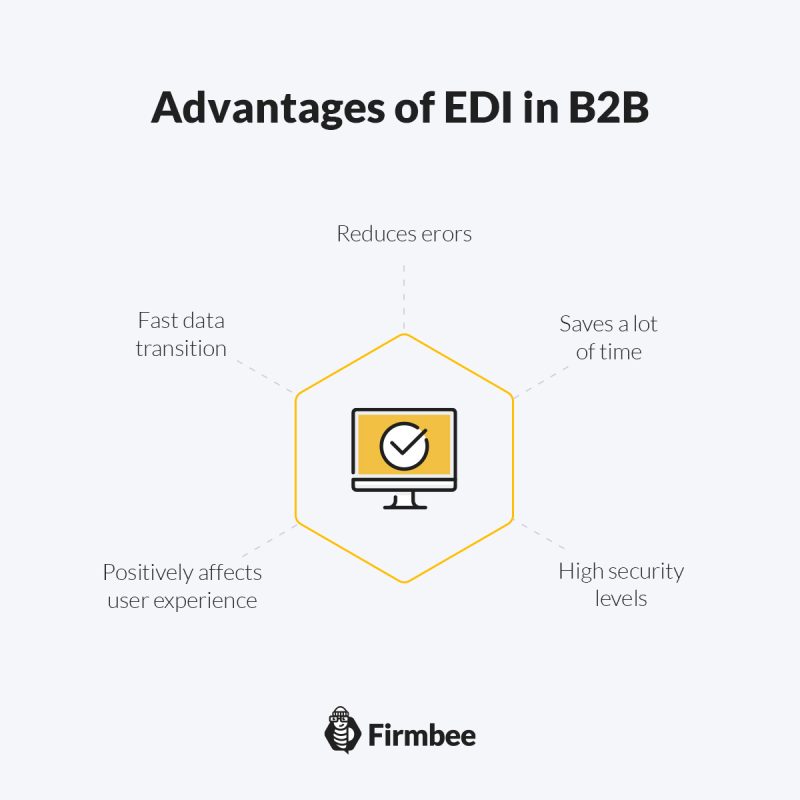EDI is a system for the electronic exchange of documents between companies. This kind of automation will come in handy when running a B2B online store. What are the advantages of its implementation? You will surely learn that and more from the following article.
EDI and B2B in e-commerce – table of contents:
- What is EDI?
- EDI and B2B e-commerce – the benefits of the combination
- B2B e-commerce will let your business reach its full potential
What is EDI?
EDI stands for Electronic Data Interchange. It involves the exchange of commercial and financial documents, such as orders, order confirmations, dispatch advice, invoices as well as correction invoices, in the form of a standard electronic message, directly between the computer systems of business partners.
The most popular electronic document formats that are mentioned are primarily the UN/EDIFACT (United Nations/Electronic Data Interchange For Administration, Commerce, and Transport) format and XML.
EDI guarantees fast and secure data transmission with any company you do business with, virtually anywhere in the world. Automated information processing runs from the beginning to the end of the supply chain – from ordering to fulfillment to invoicing and payment.
Each user of the EDI system uses a GLN or Global Location Number. It is used to identify each location that would participate in the data exchange process. There can be two types of entities:
- legal entity – a legal organization, such as entire companies or subsidiaries, including suppliers, customers, financial services companies,
- physical location – a single access point with a physical address, such as a specific room in a building, warehouse, warehouse gate, warehouse ramp, delivery point, rack, rack shelf, or room in a building.
EDI and B2B e-commerce – the benefits of the combination
EDI is a standard electronic format that replaces paper documents. It enables the integration and sharing of various types of letters, such as orders, invoices, requests for quotations, or loan applications.
It is estimated that more than 100,000 companies in the United States use Electronic Data Interchange, with giants such as Federal Express, Eastman Kodak, American Airlines, Nike, Staples, National Bank, JC Penney, and Prudential Insurance.
In most cases, companies using EDI are business partners that trade goods or services on a B2B basis.
The combination of EDI and B2B e-commerce brings many benefits to businesses. Organizations can save a lot of time with it. Thanks to automation, it is the program that processes all the data. There is no need for tedious manual entry of each record. Another advantage is that the solution increases efficiency and productivity, as it can process more business documents in less time and with greater accuracy.
In addition, sending data via EDI reduces errors. This is all due to standardization, which helps ensure that information and data are formatted correctly before it enters business processes and applications. EDI also makes analyzing information and reporting easier, as it allows integration with other information systems to facilitate the entire data processing.
EDI automation also positively affects, so important in today’s era of e-commerce, the User Experience. Customers have a positive shopping experience when purchase paths are not complicated, transactions are quick and efficient, and the company guarantees reliability in delivering products and services.

B2B e-commerce will let your business reach its full potential
In the current era of ubiquitous digitization, the development of which has been greatly accelerated by the coronavirus pandemic, it is difficult to imagine the effective operation of a company without a B2B online store. E-commerce in the business-to-business model brings many benefits. First, it increases the efficiency of the sales department – employees no longer need to handle every order and can focus on other goals, such as acquiring new customers.
B2B e-commerce operates 24 hours a day, 7 days a week, which is quite an advantage for customers and comfort for owners. They can process orders at any time of the day or night. You can read more about the benefits of implementing a B2B platform in your business HERE.
Although setting up a B2B online store may seem like a complicated process, it is well worth the effort. The whole process should start with the selection of a platform. It must have all the necessary features you need when running a business in your industry. What else should you take care of when starting in the B2B e-commerce world? You can find out in our following article.
When running a B2B online store, it is crucial to ensure a positive shopping experience. The customer must be satisfied with how the transaction went to want to come back. How do you take care of the User Experience? Read our next posts to find out!
If you like our content, join our busy bees community on Facebook, Twitter, LinkedIn, Instagram, YouTube, Pinterest.
Author: Andy Nichols
A problem solver with 5 different degrees and endless reserves of motivation. This makes him a perfect Business Owner & Manager. When searching for employees and partners, openness and curiosity of the world are qualities he values the most.


















